Vietnam Crypto Fine Calculator
Calculate Fine Impact
Convert Vietnam's cryptocurrency payment penalty into USD and see what it means in real-world terms.
Key Takeaways
- Using Bitcoin or any virtual currency as payment in Vietnam can trigger a fine of 150‑200million VND ($6,500‑$8,900).
- The ban is enforced through Decree No.96/2014/ND‑CP and related payment‑instrument decrees.
- Holding crypto is not illegal, but any transaction that treats it as money is prohibited.
- Enforcement has focused on high‑profile cases; everyday peer‑to‑peer trades often evade penalties.
- Recent drafts hint at treating crypto as a taxable asset while keeping the payment ban.
Vietnam's cryptocurrency payment ban is a legal framework that forbids using Bitcoin and other virtual currencies as a means of payment, with fines ranging from 150million to 200million VND has been a hot topic since the State Bank of Vietnam (SBV) announced it in late 2017. If you’re a merchant, a freelancer, or just someone curious about the risk, you need to know exactly what the law says, how it’s applied, and what the future might hold.
What the law actually bans
The SBV’s ban is crystal clear: issuing, supplying, or using Bitcoin and similar virtual currencies as a payment method is prohibited. This is not a blanket prohibition on owning crypto - you can still buy, hold, and trade it on exchanges - but you cannot pay for goods or services with it. The legal wording lives in Clause6, Article27 of Decree No.96/2014/ND‑CP, which sets the fine range at 150‑200million VND.
Two companion decrees tighten the definition of lawful payment tools:
- Decree101/2012/ND‑CP on non‑cash payment (amended by Decree80/2016/ND‑CP) lists only checks, bank cards, and other SBV‑prescribed instruments as legal.
- Decree96/2014/ND‑CP adds the specific penalty for crypto‑payment violations.
In short, the legal framework draws a clear line: crypto=asset, not=currency.
How the fine amount translates in everyday terms
The fine range - 150million to 200million VND - may look like a precise number, but the law doesn’t specify a sliding scale. In practice, authorities have used the lower end for first‑time offenders and the upper end for repeat or large‑scale violations. Converting the amount at the October2025 exchange rate (about 23,200VND perUSD) gives roughly $6,470-$8,620.
That’s roughly the price of a mid‑range laptop or a few months’ rent in HoChiMinh City. For a small e‑commerce shop, it can be a crippling blow; for a large corporation, it’s a manageable compliance cost.
Enforcement in action: real‑world examples
Since the ban took effect on 1January2018, the SBV has taken a handful of high‑visibility actions:
- July2017: A university announced it would accept Bitcoin for tuition. SBV intervened before the ban’s start date, forced the school to cancel the plan, and issued a warning.
- November2019: The SBV coordinated penal sanctions against several merchants that advertised crypto‑payment options on social media.
- 2022‑2023: The General Department of Vietnam Customs reported a spike in underground crypto transfers, but documented prosecutions remained limited to a few “large‑scale” operators.
Most everyday peer‑to‑peer trades slip under the radar because they lack a formal commercial fingerprint. That’s why you’ll still see active Bitcoin forums in Vietnam discussing how to stay “off the grid.”
Why Vietnam chose a strict ban
SBV officials, such as Le Truong Tung, have repeatedly warned that crypto payments threaten monetary sovereignty. Their main concerns are:
- Tax evasion: Bitcoin’s pseudo‑anonymity makes it hard for the tax authority to track income.
- Capital flight: Large crypto transfers can bypass foreign‑exchange controls.
- Legal uncertainty: No central authority can issue or regulate a decentralized token, which clashes with the SBV’s mandate.
In contrast, neighboring Thailand and Singapore have opted for licensing regimes that let crypto operate under strict oversight. Vietnam’s approach reflects a more traditional central‑bank mindset, prioritizing control over innovation.
Impact on the Vietnamese crypto ecosystem
Paradoxically, despite the ban, Vietnam ranks high on global adoption charts. Chainalysis’ 2021 Global Crypto Adoption Index placed Vietnam 8th worldwide, with an estimated 10% of the adult population holding crypto assets. The discrepancy stems from two factors:
- Vietnamese users treat crypto mainly as an investment or store of value, not as a payment method.
- Digital wallets and peer‑to‑peer platforms operate in a legal grey area, staying under the radar of SBV inspections.
The ban has also nudged fintech companies toward SBV‑approved solutions, such as QR‑code payments linked to bank accounts. While this boosts the formal digital‑payment sector, it slows down potential blockchain‑based innovations like smart‑contract escrow services.
Recent regulatory signals: is the ban softening?
In December2021, the Ministry of Justice released a Draft Decree on Management of Virtual Assets. The draft kept the payment prohibition but introduced a clear definition of crypto as an “asset” subject to taxation. The SBV’s 2022 Monetary Policy Report reiterated the same fine structure, yet the Ministry of Finance’s 2022 Draft Circular on tax management hinted at a future where crypto gains a tax code similar to stocks.
Experts like Dr. TranNgocCa argue that “the 150‑200million VND fine remains technically enforceable but has become increasingly difficult to implement as crypto usage grows.” If tax‑compliant reporting becomes mainstream, the government may focus more on revenue collection than on punitive bans.
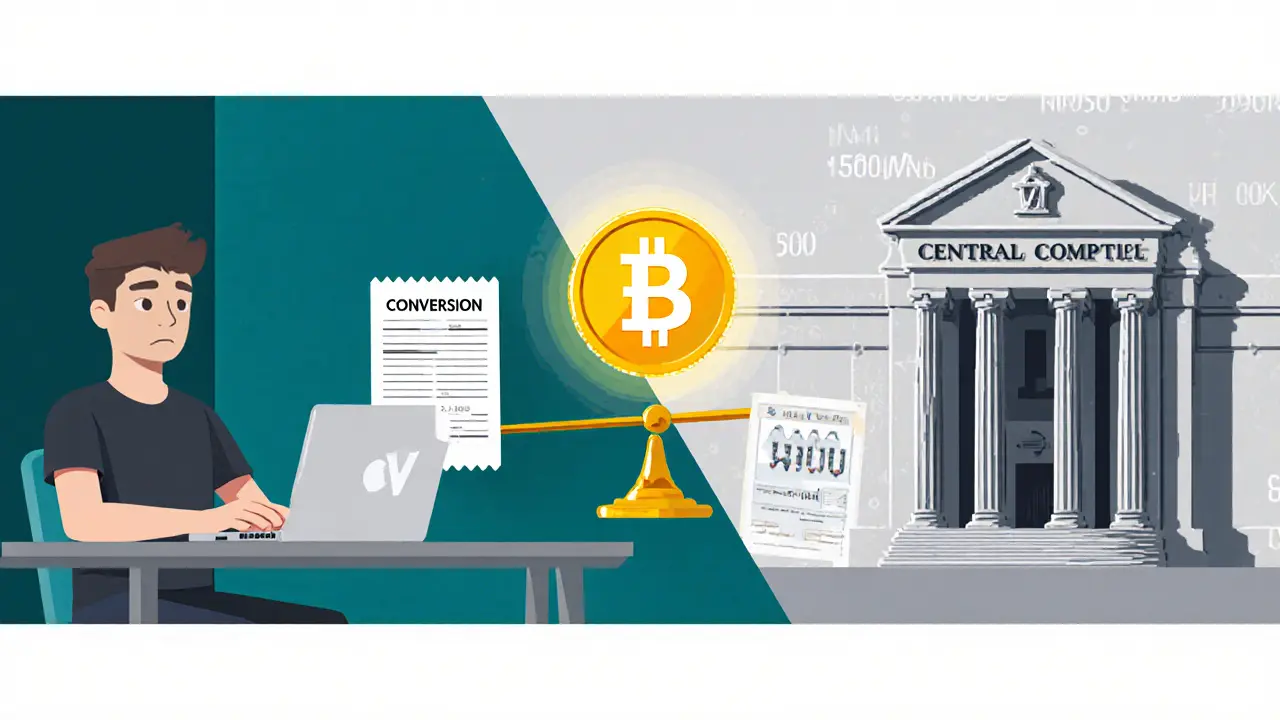
Practical steps for merchants and freelancers
If you run a shop, a SaaS platform, or do freelance work in Vietnam, here’s a quick checklist to stay on the right side of the law:
- Never list crypto as a payment option. Even a “We accept Bitcoin” banner can trigger an investigation.
- Separate asset holdings from payments. Keep any crypto you own in personal wallets, not in business accounts.
- Document all transactions. If a client wants to pay in crypto, ask them to convert it to VND first and provide proof of the conversion.
- Stay updated on draft decrees. New tax rules may require you to report crypto holdings annually.
- Consult a local legal advisor. The fine amount is high, and penalties can include temporary business suspension.
Following these steps reduces the risk of a 150million‑VND hit and keeps your operation smooth.
Comparison of Vietnam’s crypto‑payment regime with regional peers
| Country | Payment status | Fine / Penalty | Key regulator |
|---|---|---|---|
| Vietnam | Prohibited | 150‑200million VND | State Bank of Vietnam (SBV) |
| Thailand | Allowed with license | Up to 2million THB | Bank of Thailand |
| Singapore | Allowed under Payment Services Act | Varies - up to S$10,000 fine | Monetary Authority of Singapore |
| Malaysia | Restricted - only approved tokens | RM5,000‑RM20,000 | Bank Negara Malaysia |
Looking ahead: what could change?
Three forces will shape the next five years:
- International pressure: As ASEAN moves toward a harmonized digital‑asset framework, Vietnam may need to align its rules.
- Domestic demand: With more than 10% of adults investing in crypto, the government could lose tax revenue if it continues to push users underground.
- Technology adoption: Central banks worldwide are testing digital currencies (CBDCs). Vietnam’s own digital dong project could eventually replace the need for private crypto as a payment method.
Until a formal amendment appears, the safe bet is to treat the 150‑200million VND fine as a real risk for any business that touches crypto as money.
Frequently Asked Questions
Can I hold Bitcoin in Vietnam without breaking the law?
Yes. The ban only covers using crypto as a *payment* method. Buying, holding, and selling on an exchange is legal, but you must convert any crypto to VND before paying for goods or services.
What triggers the 150‑200million VND fine?
Any act that publicly offers, accepts, or processes a cryptocurrency transaction as a means of payment. This includes advertising crypto‑payment options on a website or invoicing a client in Bitcoin.
Is the fine the same for individuals and companies?
The law does not differentiate. Both natural persons and legal entities face the 150‑200million VND range, though authorities may consider the offender’s size and repeat‑offense history when setting the exact amount.
What should I do if a client insists on paying in crypto?
Ask the client to convert the crypto to VND through a licensed exchange, then pay you in the local currency. Keep a clear record of the conversion receipt to show compliance.
Will future tax rules change the fine?
Tax legislation is separate from the payment ban. Even if crypto becomes taxable, the fine for using it as payment will stay in place until a new decree explicitly removes the prohibition.

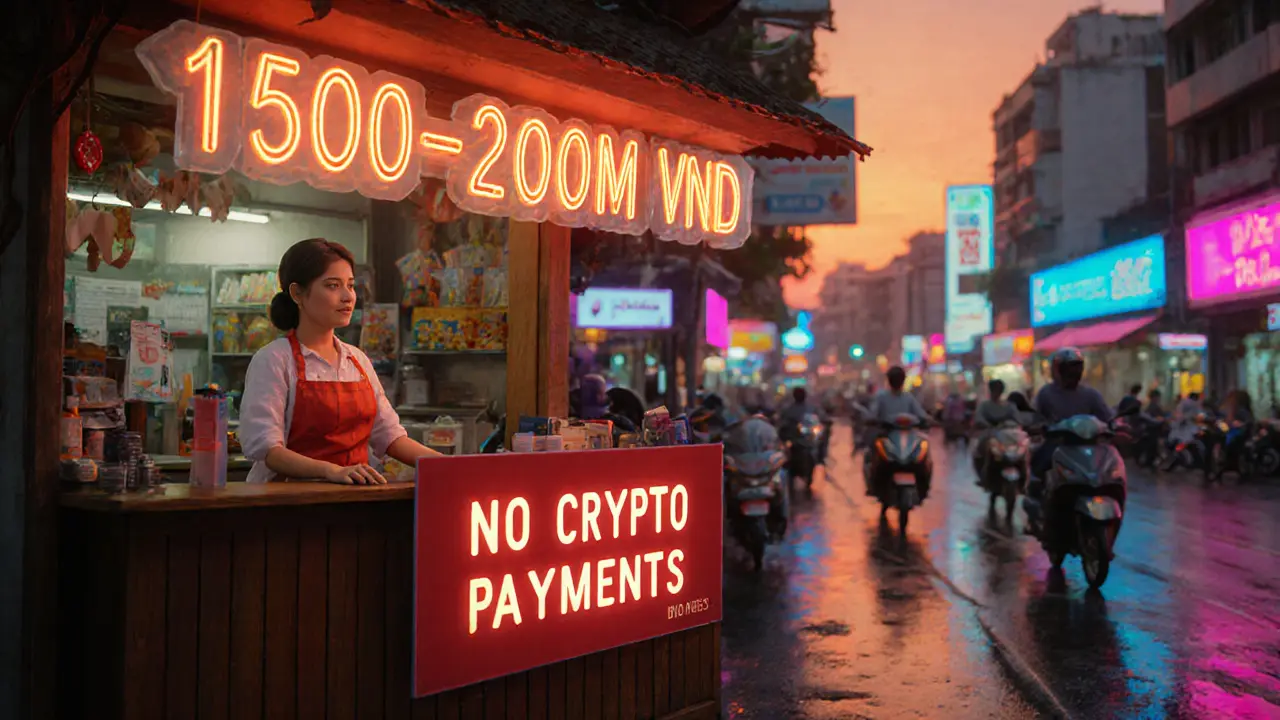
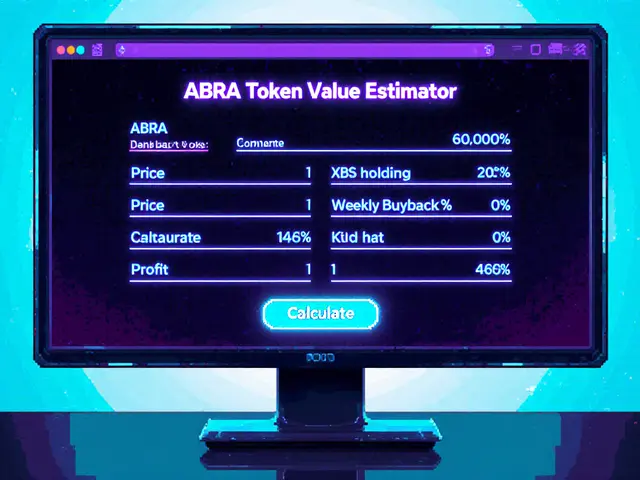


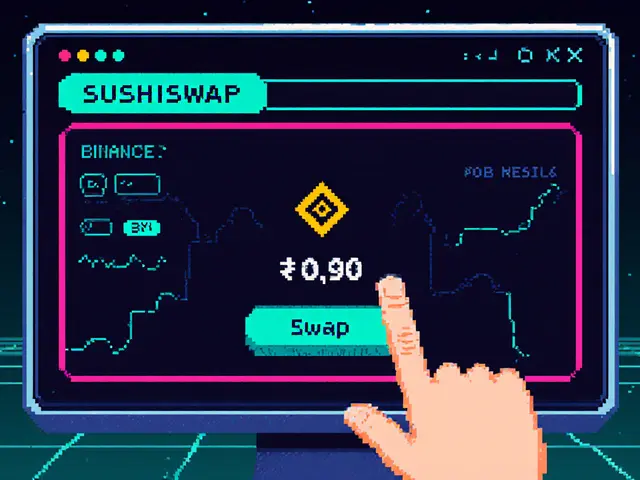
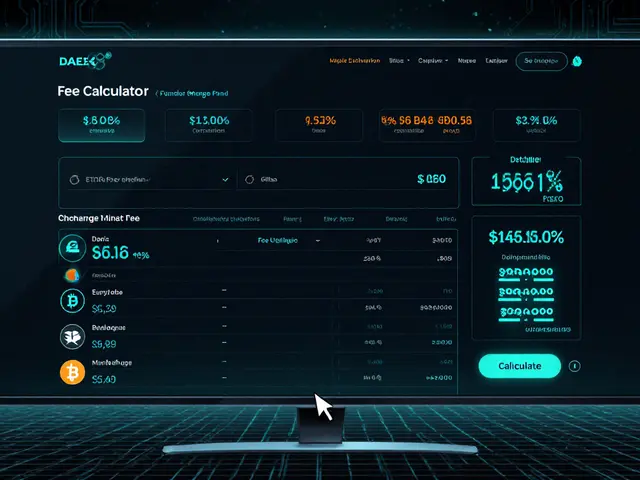
Millsaps Crista
October 16, 2025 AT 08:23If you’re running a shop or freelancing in Vietnam, the safest move is to keep crypto strictly out of the checkout. Treat any Bitcoin or alt‑coin holdings as an investment, not a payment method. Put up a clear "No crypto payments" notice on your site or storefront. Keep separate wallets for personal assets and business accounts. And always ask clients to convert to VND before you invoice – that way you stay on the right side of the 150‑200 million VND fine.
Matthew Homewood
October 17, 2025 AT 06:37The ban reflects a classic tension between state sovereignty and individual freedom. Regulators fear loss of monetary control, yet citizens see crypto as a hedge against inflation. It’s a philosophical question: should a government dictate the medium of exchange, or merely enforce tax compliance? In Vietnam’s case the balance has tipped toward control, but the underlying desire for financial autonomy remains strong.
Brian Elliot
October 18, 2025 AT 04:50To stay compliant, start by removing any crypto payment banner from your website. Keep your personal crypto in a wallet that isn’t linked to your business bank account. When a client wants to pay in Bitcoin, ask them to sell on a licensed exchange and send you the VND, then keep the conversion receipt. Document that receipt alongside the invoice – it’s the simplest proof of compliance. Finally, keep an eye on draft decrees; the tax code may change, and you’ll want to be ready.
Marques Validus
October 19, 2025 AT 03:03Look man the whole crypto‑payment ban is just a textbook case of regulatory myopia it’s like trying to stop a river by putting a coffee filter in front of it the market will always find a loophole the blockchain tech is evolving faster than any decree can keep up and the jargon‑heavy legal prose just adds noise not solutions
Teagan Beck
October 20, 2025 AT 01:17Just a heads up – if you ever get a notice about crypto payments, respond promptly and show your conversion records. It’s better to be proactive than wait for an audit. Keep everything tidy and you’ll avoid the heavy fines.
Shane Lunan
October 20, 2025 AT 23:30Nice try but this is just hype
Jeff Moric
October 21, 2025 AT 21:43I get why some businesses feel the squeeze, but the reality is clear – the law is unambiguous. Treat crypto as an asset, not a currency, and you won’t cross the line. If you’re unsure, a quick chat with a local advisor can save you a lot of trouble.
Linda Campbell
October 22, 2025 AT 19:57Vietnam’s steadfast stance on preserving monetary sovereignty is commendable and reflects a deep respect for national integrity. By prohibiting crypto payments, the State Bank safeguards the stability of the đồng against speculative volatility. Such decisive policy underscores the country’s commitment to fiscal responsibility and prudent economic governance. It is a model of disciplined regulation in a region where many are chasing fleeting trends.
Maureen Ruiz-Sundstrom
October 23, 2025 AT 18:10One might argue that an over‑zealous protection of sovereignty can inadvertently stifle innovation. While the intent is to guard against fiscal abuse, the blanket prohibition risks driving legitimate entrepreneurs underground. Philosophically, the tension between control and freedom is timeless, yet pragmatically, nuanced regulation could achieve both goals. Aggressive enforcement without adaptive policy may ultimately undermine the very stability it seeks to protect.
Tayla Williams
October 24, 2025 AT 16:23From an ethical standpoint it is indefensible to allow businesses to flaunt illegal payment methods while ordinary citizens bear the brunt of economic instability. The government has a moral duty to enforce existing laws consistently and transparently. Failure to do so erodes public trust and invites corruption. This is not just a legal issue, it is a matter of national character.
Mitch Graci
October 25, 2025 AT 14:37Wow!!! Absolutely love the moral high ground!!! 🙄🙄🙄 But maybe, just maybe, a little flexibility wouldn’t hurt? 😂😂😂
Jazmin Duthie
October 26, 2025 AT 11:50Sure, because ignoring the law always works out great.
Isabelle Graf
October 27, 2025 AT 10:03Honestly people should just read the law and stop pretending they're rebels.
John Beaver
October 28, 2025 AT 08:17Here’s a step‑by‑step rundown that should clear up most confusion around Vietnam’s crypto‑payment ban. First, understand that the law only criminalises using crypto as a direct payment method, not holding or trading it. Second, make sure your website, invoices, and any marketing material never state that you accept Bitcoin, Ether, or any other token. Third, if a client insists on paying with crypto, politely ask them to convert the amount to VND through a licensed exchange and provide you with a receipt of that transaction. Fourth, keep that receipt alongside the client’s invoice – this creates a paper trail proving you received VND, not crypto. Fifth, separate your personal crypto wallets from any business accounts; mixing them can be interpreted as using crypto for business payments. Sixth, regularly review any updates to Decree No.96/2014/ND‑CP and related drafts, especially those concerning tax treatment of virtual assets, because future regulations may introduce new reporting obligations. Seventh, consider consulting a local legal advisor who specializes in fintech; a modest consulting fee now can prevent a 150‑million‑VND fine later. Eighth, train your staff to recognize and refuse crypto‑payment requests, documenting any attempts for internal compliance records. Ninth, if you’re an online merchant, implement a checkout system that automatically rejects crypto‑based transactions. Finally, stay aware that enforcement has historically focused on high‑visibility cases, but the regulatory net is widening, so proactive compliance is the best defense. By following these measures you minimize risk, stay within the law, and can still benefit from crypto as an investment vehicle without crossing the payment line.
EDMOND FAILL
October 29, 2025 AT 06:30I see the point about documenting conversions and the risk of fines, and the suggestion to consult a local lawyer is spot on. Staying ahead of regulatory changes will keep your business safe.